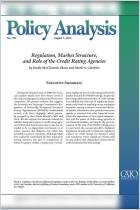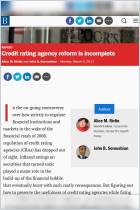Join getAbstract to access the summary!

Join getAbstract to access the summary!
Timothy J. Sinclair
The New Masters of Capital
American Bond Rating Agencies and the Politics of Creditworthiness
Cornell UP, 2005
What's inside?
Bond rating agencies aren't narrow, technical entities. They affect everything from city planning to the global economy.
Recommendation
Few writers have closely examined the work of bond rating agencies – even though their decisions can move markets, open or close the doors to capital, and even bring down governments. Timothy J. Sinclair manages to keep his prose relatively accessible, despite his many references to research that could appeal only to academics. Although his detailed analysis of various sociological characterizations of agency power may be of little interest to the general reader, getAbstract believes that his main point – rating agencies exercise power and influence well beyond the bond markets – deserves careful consideration by anyone interested in economics, finance, politics or the issue of globalization.
Summary
About the Author
Timothy J. Sinclair teaches international political economy at the University of Warwick. He is the co-author of Approaches to World Order and the editor of Global Governance: Critical Concepts in Political Science, Structure and Agency in International Capital Mobility and Approaches to Global Governance Theory.























Comment on this summary